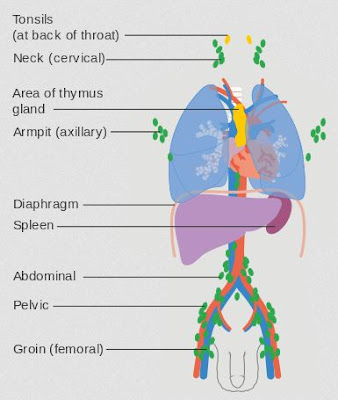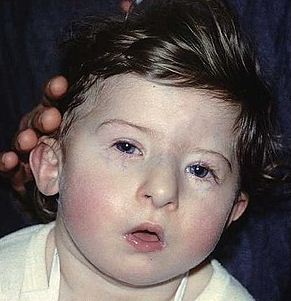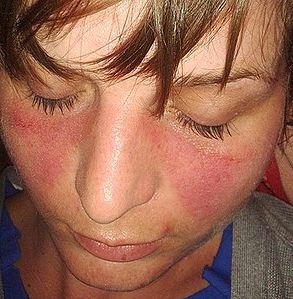INTRODUCTION
The immune system is essential in human since it combats the germs that try to attack the human body and keep the body fit and healthy.
- Are you aware of that human T-cells trained and selected?
- How and where our T-cells qualified and stocked?
- What are the roles of T-cells?
Here you can find the answers.
The Thymus gland is a secretory gland, which plays a vital role in the immune system. This gland is active until puberty and then it starts to shrink slowly and replaced by fat.
 |
| LOCATION OF THYMUS GLAND |
This gland is a soft organ located behind the breastbone and in between the lungs. The pinkish grey organ is triangular and has two lobes. The thymus attains its greatest weight (about 1 ounce) during puberty.
T-lymphocytes or T cells a special type of white blood cell that defends the body from certain threats, including viruses and infections. During childhood, the thymus aids in the creation and maturation of these T-cells.
HORMONE AND ITS FUNCTION
The Thymus gland secretes the hormone Thymosin. Thymosin aids in the functioning of the immune system i.e. growth of T-cells. T-cells help in clearing the damaged cells and pathogens from the body through the network of vessels and tissues.
 |
| THYMOSIN - HORMONE |
Image Source : Wikimedia Commons
During childhood, WBC, lymphocytes, or immature T-cells developed from the bone marrow makes contact with the thymus gland and it transformed into T-cells. After the maturation period, it moves to the lymph nodes (storehouse of immune cells).
The role of the thymus is to receive the immature T-cells and train them to attack foreign agents through positive selection. If the T-cells perform well in attacking, the foreign agents will survive and moves to the medulla the other T-cells will die by the apoptosis in the healthy patient.
The T-cells after reaching the medulla will become mature. The role of T-cells is to kill pathogens, triggering the B-cells to produce antibodies against antigens, to store the memories of infections and viruses, which have attacked earlier so able to fight when it comes back.
DISORDERS
The Thymus gland aids in the creation and development of the T-cells if there occurs any imbalance or problem in T-cells it affects the immune system of the body. Thymus disorder could be from a gene which results in thymus problem from childbirth.
(i) Severe Combined Immunodeficiency (SCID): SCID also indicated as ‘Bubble baby syndrome’. SCID is an inherited syndrome and abnormal defect in which the body creates very few T-Cells. The reasons for genetic modification are due to the lack or misbehave of protein, which is fundamental for the growth and function of the immune system.
SCID occurs when a patient has variations in many genes (i.e., gene mutation) leads to distress of the fundamental development of T-cells. SCID occurs due to gene mutation in any one of the genes. Several genes could be effected each causing different types of SCID.
Children with SCID look healthy during birth (since antibodies carried from mother via the placenta) but as they grow, they are highly prone to diseases since they have a weak immune system. Therefore, the name ‘Bubble baby syndrome’.
The treatments for SCID are haematopoietic stem cell transplantation (HSCT, or SCT) (bone marrow transplantation) and gene therapy. Gene Therapy is still in research.
(ii)DiGeorge Syndrome: DiGeorge syndrome is an inborn immunodeficiency dysfunction in which the thymus gland is lack or undeveloped at birth. This caused due to the deletion of a part of the chromosome resulting in the week growth of the thymus and other parts in the immune system.
 |
| DiGeorge
syndrome- tubular nose and carp-shaped mouth |
Image Source : Wikimedia Commons
The impact of this disorder can be from mild to acute. DGS continues throughout life. It affects infants and children. The symptoms are improper development, poor development of the jaw, difficulty in learning, and slow in speaking.
The treatments for DGS are for acute case Thymus tissue transplantation and for mild case injecting immune cells.
(iii) Thymic Cancers: as the thymus gland, present in the centre of the chest and near some of the blood vessels tumors on this gland can compress the nearby regions.
There are two different types of cancer found in this gland Thymomas, and Thymic. In both the case, it forms the cancer cells in the outer layer of the Thymus gland. The difference between the two is Thymomas cancer cells grow gradually and slowly whereas thymic cells grow quickly, replicates, and spread to other regions of the body.
Thymomas: It is a condition where the immune system assaults the body itself (an autoimmune disorder).
 |
| Autoimmune disorder - Butterfly like rash found in the face |
The symptoms of thymus cancer include breathing difficulty, cough, chest pain, loss of weight due to improper swallow. These symptoms occur due to tumours or might be paraneoplastic syndrome.
PARANEOPLASTIC SYNDROME:
(a) Myasthenia gravis (MG): MG is the most general autoimmune disorder related to Thymomas. Most of the people who suffer from Thymomas have MG and most of the people with MG do not have Thymomas.
In this condition, the immune system generates antibodies, which hold off the chemical signals that are indicated by the muscles to move resulting in muscle weakness. They have complications like tiredness, difficulty in walking or climbing long distances, weak muscle strength all over the body.
 |
| Myasthenia
gravis - trying to open the eyes. |
Image Source : Wikimedia Commons
The symptoms are weak eye muscle results in poor vision, weak neck muscles lead to the problem in swallowing, weak chest muscle, and diaphragm cause breathing difficulty.
The treatments are by removal of the thymus (either presence or absence of Thymomas) or by taking medicines for strengthening the chemical signals to muscles or by weakening the immune assault on the muscles.
(b) Red cell aplasia(RCA): This is a condition in which the body losses its efficiency to produce new RBC’s resulting in decreased RBCs in the blood. The reduced level of RBC in the blood causes Anaemia. The symptoms are weakness, dizziness, and tiredness.
The RCA treated by removing the thymus gland.
(c) Hypogammaglobulinemia: The body is inefficient in producing enough amounts of infection-fighting antibodies (referred to as gamma globulins). This results in highly prone to infections. Removal of the thymus gland does not aid to correct this disease.
The treatments for cancer in the thymus gland depend on how far the cancer cells have developed. The optional treatments are chemotherapy, radiation therapy, and drugs.
CONCLUSION
The immune system plays a vital role in keeping our body fit and well by protecting against the foreign objects that enter our body. Therefore, it is necessary to consume good food to keep our physic T-cells to functions properly.



No comments: